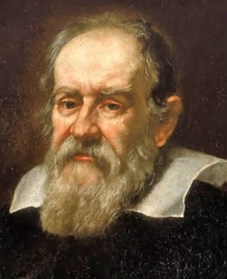Galileo Galilei
 Galileo Galilei (1564-1642) was a physicist, astronomer, mathematician and philosopher, the founder of the modern experimental method. After the initial research and discoveries of his youth, he obtained the chair of mathematics in Pisa (1589), but then moved to Padua three years later. In 1609 he perfected the telescope, which he used for his astronomical discoveries, which he put forward in the Sidereus Nuncius (1610) : the satellites of Jupiter, the phases of Venus and sunspots. After returning to Pisa at the invitation of the Grand Duke Cosimo II, Galileo outlined the method of modern science in The Assayer (1623). His support for the Copernican heliocentric system, in contrast to the Aristotelian-Ptolemaic geocentric theory, however, attracted the attention of the Church. After the publication of the Dialogue Concerning the Two Chief World Systems (1632), he was called to Rome and tried for heresy. He abjured his thesis and was condemned, then old and sick, to confinement at Arcetri, where he continued his research assisted by his students.
Galileo Galilei (1564-1642) was a physicist, astronomer, mathematician and philosopher, the founder of the modern experimental method. After the initial research and discoveries of his youth, he obtained the chair of mathematics in Pisa (1589), but then moved to Padua three years later. In 1609 he perfected the telescope, which he used for his astronomical discoveries, which he put forward in the Sidereus Nuncius (1610) : the satellites of Jupiter, the phases of Venus and sunspots. After returning to Pisa at the invitation of the Grand Duke Cosimo II, Galileo outlined the method of modern science in The Assayer (1623). His support for the Copernican heliocentric system, in contrast to the Aristotelian-Ptolemaic geocentric theory, however, attracted the attention of the Church. After the publication of the Dialogue Concerning the Two Chief World Systems (1632), he was called to Rome and tried for heresy. He abjured his thesis and was condemned, then old and sick, to confinement at Arcetri, where he continued his research assisted by his students.
